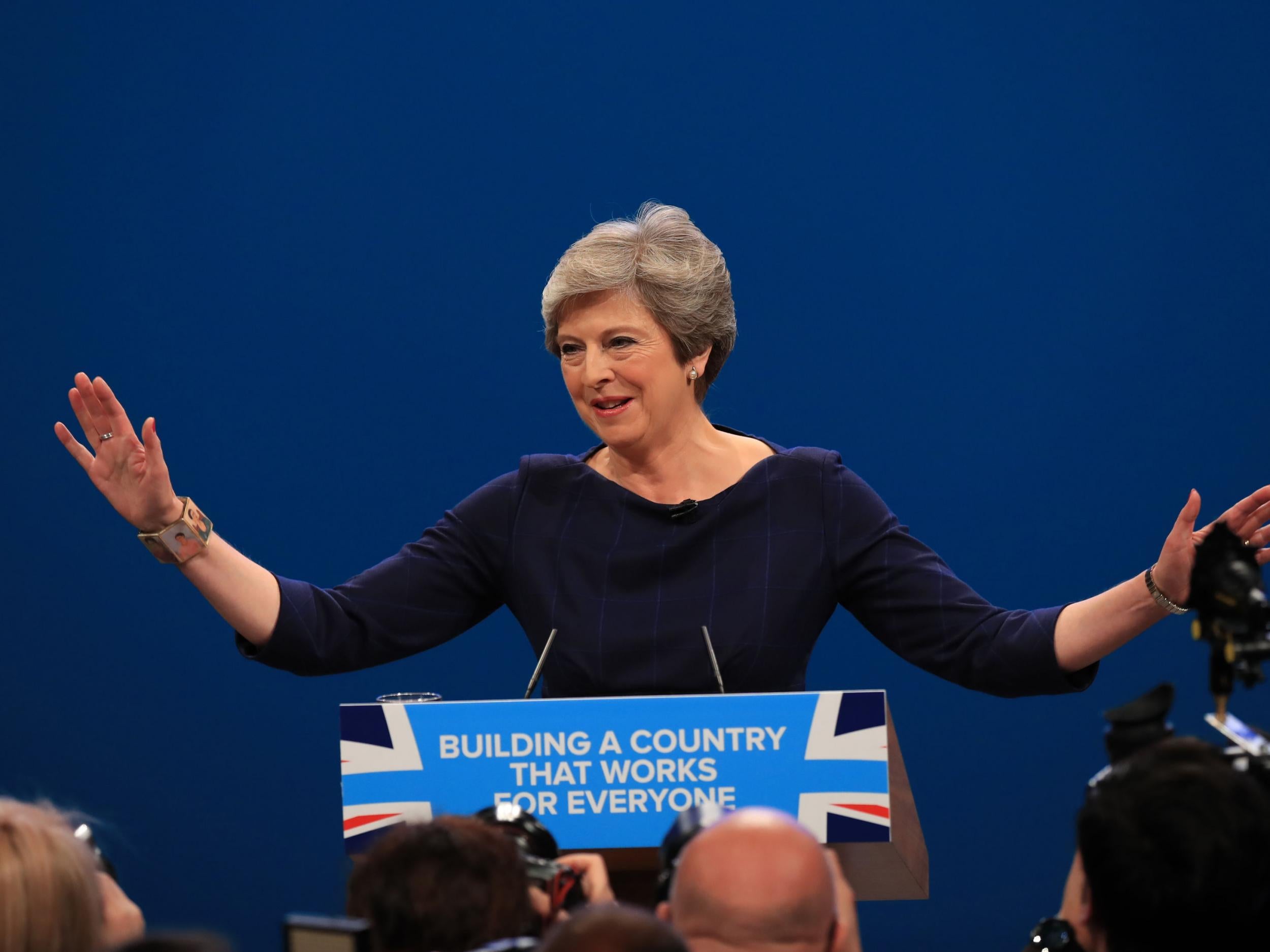Theresa May has big ambition – but her plans are not radical enough to tempt voters away from Corbyn
The simple fact that is that there are now many people in the UK who don’t believe in the verity of the capitalist approach

Last week, at the Labour Party conference, Jeremy Corbyn presented himself with some conviction as the leader of a government in waiting. Today, at the Conservative equivalent, Theresa May did a good impression of a woman stuck in a doctor’s waiting room. Her coughing fits were only temporarily reprieved by the Chancellor’s hastily unearthed lozenge and, by the end of her keynote speech, it was difficult to avoid the impression that she had failed to proffer any long-term remedies to Britain’s ills either.
It was, in truth, hard too not to feel sorry for the Prime Minister, whose voice faltered so frequently that some observers wondered if she would make it to the end of her address. Even the prankster who ran up to the podium with a mock P45 seemed almost half-hearted in his actions: it’s all very well to poke fun at an iron-fisted Tory PM who is lording over the masses, but rather less fun to take on a woman who looks as if she needs a lie-down.
Nor could Ms May have had any control over the staging failure which resulted in letters falling off the slogan behind her. That the slogan read “Building a country that works for everyone” was simply the icing on the cake.
But while the Tory faithful will insist that the Prime Minister’s determination to overcome such immediate travails was symbolic of her leadership qualities, for many it looked as if Ms May’s authority was crumbling before their very eyes. And these days, presentational issues matter.
Most significantly though, she was unable to distract attention from her spluttering delivery by any especially dramatic policy announcements.
She rightly identified the central problem that underpins the dismay affecting so many in this country: the feeling that younger generations have little chance of creating better futures for themselves or, as Ms May put it, of living out the “British dream”, which sadly doesn’t have quite the same ring as its American cousin. But having come up with a diagnosis, the medicine on display was inadequate.
At the heart of a modest package of pledges was a promise to fix the broken housing market, in particular by launching a new construction programme of affordable homes, worth £2bn overall. Combined with the previously announced expansion of the Help to Buy scheme, the Prime Minister’s desire to “get the Government back into the business of building houses” certainly struck a positive note, even if it had been nabbed from Labour’s songbook (as had her plan to cap energy prices).
Yet even here, on what is arguably the single most important domestic policy question facing the country, Ms May came up short. In the immediate aftermath of her speech, it was suggested that the number of council homes in line to be built would amount to around 25,000 over five years – a trifling number indeed. Even if the new investment enables an increase in the number of housing association affordable homes being built annually too (around 25,000 at present), demand will continue to outpace supply by many times.

The Conservatives are quite correct to prioritise an expansion in the number of new homes being built in the UK – but the investment on the table is inadequate.
Likewise, promises to improve mental health services; to increase the numbers of doctors and nurses being trained; to build more free schools; and to improve technical training for 16-year-olds all have some merit – but they are tinkering at the edges compared with the bold social changes that Jeremy Corbyn appears to offer.
Brexit was addressed too, of course, without offering any particular insights beyond the usual platitudes. The Cabinet, looking on, seemed determinedly united – but really it is only the prospect of a Labour government that is keeping a loose lid on Tory divisions.
Not since Tony Blair’s heyday have the fortunes of Britain’s two main political parties contrasted so starkly, nor done so to Labour’s benefit. In the past fortnight the difference in atmosphere at the two annual conferences has been almost tangible.

While “borrowing” those Labour policies she believes are palatable to her own party, the Prime Minister and her Cabinet have made a concerted attempt this week to use comparisons with Jeremy Corbyn and his team to their advantage. In particular, they have sought to pour scorn on Labour’s “return” to socialism and to remind the country of the benefits of the free market – the economic model of which the Tories are the greatest champions.
But the simple fact that is that there are now many people in the UK who don’t believe in the verity of the capitalist approach. Indeed, people born in the 1980s – Thatcher’s children – have, by the time they are 31, just half the personal wealth (including pensions and property) than those who were born in the 1970s did at the same age.
If Ms May found it difficult to get out her words describing the brilliance of free market performance, it is as nothing compared to the challenge of making those assurances believable. A lozenge won’t cut it – perhaps a large dose of salt will do the trick.
Join our commenting forum
Join thought-provoking conversations, follow other Independent readers and see their replies
Comments
Bookmark popover
Removed from bookmarks